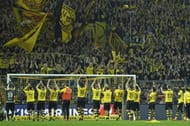
Bayern Munich's 6-0 rout of TSG Hoffenheim today in the German Bundesliga ended in a very strange manner when the game was halted as a result of the away fans protesting against Hoffenheim owner Dietmar Hopp.
In the 77th minute of the game, the Bavarian fans unraveled banners which insulted Hopp and the referee had no option but to halt the game amidst the heated atmosphere at the Rhein-Neckar-Arena.
The players briefly left the pitch before returning and then things started to get really strange as rather than playing on, the two sets of players began passing the ball to each other, with no intentions to compete with each other.
The outburst of the travelling fans has a bit of history attached to it, and it dates back to 2015 when Hopp took over majority of voting rights in 1899 Hoffenheim over and above his existing 49 per cent in the club.
Now, this isn'tt be an unusual thing in the current era of world football where the business side of the game has also advanced to a pretty high level, in some cases even overlapping the passion for it.
But German football has been an exception to such influence of business in football, and this is where the 50 plus 1 rule comes into picture.
The Bundesliga '50+1 Rule' explained

In 1998, the German Football League Board (DFB) amended its rules to prevent German clubs from welcoming any kind of a private ownership from commercial investors.
This means that the clubs can have private investors on-board in their administration, but 50 per cent or more voting rights shall always vest with the club or any not-for-profit organisation.
This was done to protect the interests of the fans as German football stakeholders wanted to make sure that a fan is treated as 'a supporter and not as a customer'.
Talking about the same, Borussia Dortmund CEO Hans-Joachim Watzke said this in 2016:
“The German spectator traditionally has close ties with his club, and the 50+1 rule does significantly more good than harm in Germany. Most clubs won’t get a Roman Abramovich, who in the first place wants to see Chelsea winning. Most of the investors want to earn money. And where do they get it from? The spectators.
In essence, this means that private investors cannot take over clubs and potentially push through measures that prioritize profit over the wishes of supporters. The ruling simultaneously protects against reckless owners and safeguards the democratic customs of German clubs.
Flaws & challenges to the 50+1 rule
A big flaw which lies in the 50+1 rule is the apparent exemption given to some clubs.
The exemption from the rule states that, if any club has had a private ownership for more than 20 years, they need not comply with the 50+1 rule and are officially exempted from the same.
Bayer Leverkusen and Wolfsburg are two such cases who have been granted exemption under the same.
A big challenge to this rule firstly has been the introduction of RB Leipzig on the horizon of German football and secondly, the subsequent Hoffenheim ownership switching into the hands of Dietmar Hopp, with both the clubs being granted special exemption.
In 2009, Austrian energy drink giant Red Bull rebranded fifth-tier team SSV Markranstädt to form RB Leipzig who then climbed through the divisions to finish as Bundesliga runners-up in 2016/2017 and qualify for the UEFA Champions League.
The majority of RB Leipzig ownership lies with Red Bull which is a private commercial enterprise.
In 2014, software billionaire Dietmar Hopp was given the green light to take majority control of Hoffenheim after investing consistently over two decades.
Since then, the supporters of other clubs have been actively protesting against RB Leipzig and Hoffenheim during the Bundesliga games which took an ugly turn in today's fixture between Die Kraichgauer and Die Bayern.
In an era where both the FIFA and UEFA Boards have been trying to make the competitions more fair and just for each club, on and off the field, the German Football Board might just have to find common grounds for both sets of protesters in today's unfortunate event.
